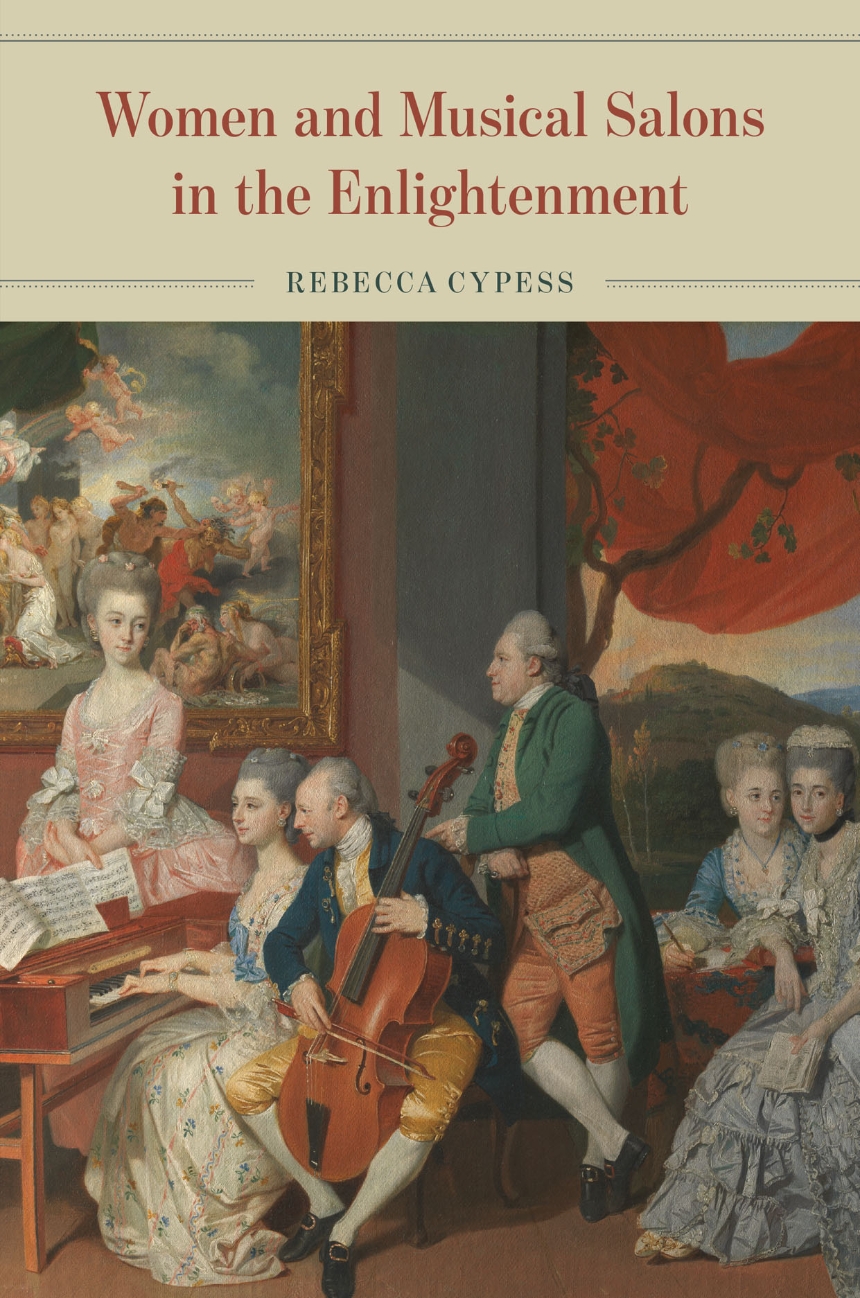Women and Musical Salons in the Enlightenment
A study of musical salons in Europe and North America between 1760 and 1800 and the salon hostesses who shaped their musical worlds.
In eighteenth-century Europe and America, musical salons—and the women who hosted and made music in them—played a crucial role in shaping their cultural environments. Musical salons served as a testing ground for new styles, genres, and aesthetic ideals, and they acted as a mediating force, bringing together professional musicians and their audiences of patrons, listeners, and performers. For the salonnière, the musical salon offered a space between the public and private spheres that allowed her to exercise cultural agency.
In this book, musicologist and historical keyboardist Rebecca Cypess offers a broad overview of musical salons between 1760 and 1800, placing the figure of the salonnière at its center. Cypess then presents a series of in-depth case studies that meet the salonnière on her own terms. Women such as Anne-Louise Brillon de Jouy in Paris, Marianna Martines in Vienna, Sara Levy in Berlin, Angelica Kauffman in Rome, and Elizabeth Graeme in Philadelphia come to life in multidimensional ways. Crucially, Cypess uses performance as a tool for research, and her interpretations draw on her experience with the instruments and performance practices used in eighteenth-century salons. In this accessible, interdisciplinary book, Cypess explores women’s agency and authorship, reason and sentiment, and the roles of performing, collecting, listening, and conversing in the formation of eighteenth-century musical life.
In eighteenth-century Europe and America, musical salons—and the women who hosted and made music in them—played a crucial role in shaping their cultural environments. Musical salons served as a testing ground for new styles, genres, and aesthetic ideals, and they acted as a mediating force, bringing together professional musicians and their audiences of patrons, listeners, and performers. For the salonnière, the musical salon offered a space between the public and private spheres that allowed her to exercise cultural agency.
In this book, musicologist and historical keyboardist Rebecca Cypess offers a broad overview of musical salons between 1760 and 1800, placing the figure of the salonnière at its center. Cypess then presents a series of in-depth case studies that meet the salonnière on her own terms. Women such as Anne-Louise Brillon de Jouy in Paris, Marianna Martines in Vienna, Sara Levy in Berlin, Angelica Kauffman in Rome, and Elizabeth Graeme in Philadelphia come to life in multidimensional ways. Crucially, Cypess uses performance as a tool for research, and her interpretations draw on her experience with the instruments and performance practices used in eighteenth-century salons. In this accessible, interdisciplinary book, Cypess explores women’s agency and authorship, reason and sentiment, and the roles of performing, collecting, listening, and conversing in the formation of eighteenth-century musical life.
See supplementary musical examples, figures, and audio tracks for the book.
368 pages | 39 halftones, 29 line drawings | 6 x 9 | © 2022
History: European History
Music: General Music
Reviews
Table of Contents
List of Figures, Musical Examples, and Audio Examples
Acknowledgments
Introduction
1 Musical Salons as Liminal Spaces: Salonnières as Agents of Musical Culture
2 Sensuality, Sociability, and Sympathy: Musical Salon Practices as Enactments of Enlightenment
3 Ephemerae and Authorship in the Salon of Madame Brillon
4 Composition, Collaboration, and the Cultivation of Skill in the Salon of Marianna Martines
5 The Cultural Work of Collecting and Performing in the Salon of Sara Levy
6 Musical Improvisation and Poetic Painting in the Salon of Angelica Kauffman
7 Reading Musically in the Salon of Elizabeth Graeme
Conclusion
Bibliography
Index
Acknowledgments
Introduction
1 Musical Salons as Liminal Spaces: Salonnières as Agents of Musical Culture
2 Sensuality, Sociability, and Sympathy: Musical Salon Practices as Enactments of Enlightenment
3 Ephemerae and Authorship in the Salon of Madame Brillon
4 Composition, Collaboration, and the Cultivation of Skill in the Salon of Marianna Martines
5 The Cultural Work of Collecting and Performing in the Salon of Sara Levy
6 Musical Improvisation and Poetic Painting in the Salon of Angelica Kauffman
7 Reading Musically in the Salon of Elizabeth Graeme
Conclusion
Bibliography
Index
